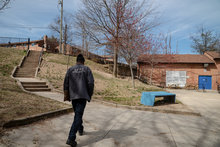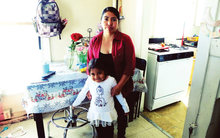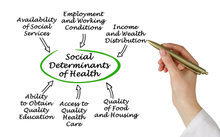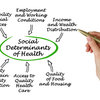0
Research
Community:
May 21, 2019
The Youth Risk Behavior Survey (YRBS) was first developed by the Centers for Disease Control and Prevention (CDC) in 1990 to assess the health risk behaviors of youth and adults in the United States. For the first time since the survey has been widely administered, the 2017 YRBS optional question list included two questions pertaining to homelessness. SchoolHouse Connection analyzed demographic and risk factor data from the YRBS in 17 states[1], comparing high school students experiencing homelessness and those not experiencing homelessness. This series shares the striking and heartbreaking results of that analysis, with tangible action steps schools can take to promote safety and health for students experiencing homelessness.
Authored by: SchoolHouse Connection
Topics: Education, Homelessness, Low-income, Research, Youth
 Shared by Housing Is
Shared by Housing Is
Housing Is posted a
on May 21, 2019
The Youth Risk Behavior Survey (YRBS) was first developed by the Centers for Disease Control and Prevention (CDC) in 1990 to assess the health risk behaviors of youth and adults in the United States.
0
News Article
Community:
May 16, 2019
Mold. Leaks. Rodents. Crime. These are just some of the things the nation's 2 million public housing residents have to worry about. Many of the buildings they live in have been falling into disrepair for decades. Public housing officials estimate that it would cost $50 billion to fix them up. But the Trump administration wants to eliminate the federal fund now used to repair public housing in favor of attracting more private investment to fix up and replace it.
Authored by: Pam Fessler for NPR
Topics: CLPHA, Funding, Housing, Legislation & Policy, Low-income
 Shared by Housing Is
Shared by Housing Is
Housing Is posted a
on May 20, 2019
Mold. Leaks. Rodents. Crime. These are just some of the things the nation's 2 million public housing residents have to worry about. Many of the buildings they live in have been falling into disrepair for decades. Public housing officials estimate that it would cost $50 billion to fix them up.
0
News Article
Community:
May 12, 2019
Charlotte city planners working to rewrite outdated zoning codes are exploring a controversial and bold idea of eliminating single-family zoning. Leaders are following cues from other cities like Minneapolis, Minnesota, and Grand Rapids, Michigan, which have taken the step in an effort to undo decades of racial segregation and income inequality in housing.
Authored by: Jessa O'Connor for WFAE 90.7
Topics: Housing, Legislation & Policy, Low-income, Racial inequalities, South
 Shared by Housing Is
Shared by Housing Is
Housing Is posted a
on May 20, 2019
Jessa O'Connor for WFAE 90.7
Charlotte city planners working to rewrite outdated zoning codes are exploring a controversial and bold idea of eliminating single-family zoning.
0
News Article
Community:
May 10, 2019
A decade from now, most middle-income seniors will not be able to pay the rising costs of independent or assisted living.
Authored by: Paula Span for The New York Times
Topics: Health, Legislation & Policy, Low-income, Seniors
 Shared by Housing Is
Shared by Housing Is
Housing Is posted a
on May 20, 2019
Paula Span for The New York Times
A decade from now, most middle-income seniors will not be able to pay the rising costs of independent or assisted living.
0
Communications
Community:
On May 10, 2019, the U.S. Department of Housing and Urban Development (HUD) published a proposed rule that would prohibit “mixed-status" families from living in public and other subsidized housing. Mixed-status families are households that include both members who are eligible and ineligible for housing assistance based on their immigration status. Both statute and regulation allow families to live together in subsidized housing even if one family member is ineligible so long as the housing subsidy is decreased to exclude the ineligible person from the assistance. Importantly, just because a household member is an “ineligible” immigrant, it doesn’t mean that they are undocumented. Immigrants can have legal status and still not be eligible for public housing and Section 8 programs.
Authored by: National Low Income Housing Coalition and National Housing Law Project
Topics: Homelessness, Housing, Immigrants, Legislation & Policy, Low-income
 Shared by Housing Is
Shared by Housing Is
Housing Is posted a
on May 15, 2019
National Low Income Housing Coalition and National Housing Law Project
On May 10, 2019, the U.S. Department of Housing and Urban Development (HUD) published a proposed rule that would prohibit “mixed-status" families from living in public and other subsidized housing.
0
News Article
Community:
May 15, 2019
Other cities have combined books and subsidized housing, but the outgoing mayor, Rahm Emanuel, has embraced the concept with three striking new projects.
Authored by: Michael Kimmelman for The New York Times
Topics: Housing, Literacy, Low-income, Midwest, Youth
 Shared by Housing Is
Shared by Housing Is
Housing Is posted a
on May 15, 2019
Michael Kimmelman for The New York Times
Other cities have combined books and subsidized housing, but the outgoing mayor, Rahm Emanuel, has embraced the concept with three striking new projects.
0
Publication
Community:
May 14, 2019
Low- and moderate-income families in Puerto Rico would get a significant income boost from the Working Families Tax Relief Act, which would substantially expand the Child Tax Credit (CTC) in Puerto Rico as well as nationally and also help the Commonwealth expand its own, recently implemented Earned Income Tax Credit (EITC). The bill, which Senators Sherrod Brown, Michael Bennet, Richard Durbin, and Ron Wyden introduced recently, would reduce poverty and increase economic security for millions of working families in the United States, including Puerto Rico.
Authored by: Javier Balmaceda for The Center on Budget and Policy Priorities
Topics: Child welfare, Legislation & Policy, Low-income, U.S. Territories
 Shared by Housing Is
Shared by Housing Is
Housing Is posted a
on May 15, 2019
Javier Balmaceda for The Center on Budget and Policy Priorities
Low- and moderate-income families in Puerto Rico would get a significant income boost from the Working Families Tax Relief Act, which would substantially expand the Child Tax Credit (CTC) in Puerto Rico as well as nationally and also help the Commonwealth expand its own, recently implemented Earned
0
News Article
Community:
May 7, 2019
The Trump administration is proposing regulatory changes that could result in cuts in federal aid to millions of low-income Americans.
Authored by: Annie Karni for The New York Times
Topics: Food insecurity, Legislation & Policy, Low-income, Medicaid / Medicare
 Shared by Housing Is
Shared by Housing Is
Housing Is posted a
on May 14, 2019
Annie Karni for The New York Times
The Trump administration is proposing regulatory changes that could result in cuts in federal aid to millions of low-income Americans.
0
Video
Community:
Resident story gallery
Authored by: National Housing Trust and Enterprise Community Partners
Topics: Communications, Homelessness, Housing, Low-income
 Shared by Housing Is
Shared by Housing Is
Housing Is posted a
on May 13, 2019
National Housing Trust and Enterprise Community Partners
0
Video
Community:
May 9, 2019
On May 9, the Brookings Institution hosted an event to discuss the subsequent report, “A Roadmap to Reducing Child Poverty.” The event featured comments from Greg Duncan, who served as Chair of the Committee on Building an Agenda to Reduce the Number of Children in Poverty by Half in 10 Years, as well as a panel discussion on the report, its recommendations, and barriers to implementation. A second panel highlighted national and state policy perspectives of the consensus study report.
Authored by: The Brookings Institution
Topics: Early childhood, Funding, Housing, Legislation & Policy, Low-income, Research, Youth
 Shared by Housing Is
Shared by Housing Is
Housing Is posted a
on May 13, 2019
The Brookings Institution
On May 9, the Brookings Institution hosted an event to discuss the subsequent report, “A Roadmap to Reducing Child Poverty.” The event featured comments from Greg Duncan, who served as Chair of the Committee on Building an Agenda to Reduce the Number of Children in Poverty by Half in 10 Years, as we
0
Report
Community:
In fact, Syracuse’s experience feels both unique and all too common for U.S. cities, particularly Great Lakes cities: federally sanctioned housing disinvestment; sprawling outward development; stagnating or declining and
segregated population; fractured local government and school systems; and outdated infrastructure.
Authored by: Anthony Armstrong & Make Communities for The Poverty and Race Research Action Council (PRRAC)
Topics: Community development, Housing, Legislation & Policy, Low-income, Racial inequalities, Research
 Shared by Housing Is
Shared by Housing Is
Housing Is posted a
on May 10, 2019
Anthony Armstrong & Make Communities for The Poverty and Race Research Action Council (PRRAC)
In fact, Syracuse’s experience feels both unique and all too common for U.S.
0
News Article
Community:
May 6, 2019
The pilot program aims to boost housing affordability and equity in Minneapolis.
Authored by: Emma Dill for The Minnesota Daily
Topics: Housing, Legislation & Policy, Low-income, Midwest
 Shared by Housing Is
Shared by Housing Is
Housing Is posted a
on May 9, 2019
Emma Dill for The Minnesota Daily
The pilot program aims to boost housing affordability and equity in Minneapolis.
0
News Article
Community:
May 6, 2019
A new study shows that Miami’s affordable housing crisis is so dire, the city needs at least 50,000 units just to meet the existing need. But the Connect Capital Miami Report, which was released Monday, also reveals a combination of tools and resources that could help alleviate the dearth of housing for cost-burdened residents.
Authored by: Rene Rodriguez for the Miami Herald
Topics: Funding, Housing, Legislation & Policy, Low-income, Research
 Shared by Housing Is
Shared by Housing Is
Housing Is posted a
on May 7, 2019
Rene Rodriguez for the Miami Herald
A new study shows that Miami’s affordable housing crisis is so dire, the city needs at least 50,000 units just to meet the existing need.
0
News Article
Community:
May 1, 2019
The U.S. economy is enjoying nearly a decade of expansion since the Great Recession. Yet food insecurity -- a lack of money or resources to secure enough to eat -- still grips almost one in eight Americans. That's roughly 40 million people. While slowly improving, that figure remains stubbornly higher than before the recession, when more than one in 10 U.S. residents had difficulty knowing when and how they might eat next, according to data from the U.S. Department of Agriculture.
Authored by: Rachel Layne for CBS News
Topics: Food insecurity, Health, Low-income, Nutrition
 Shared by Housing Is
Shared by Housing Is
Housing Is posted a
on May 6, 2019
Rachel Layne for CBS News
The U.S. economy is enjoying nearly a decade of expansion since the Great Recession. Yet food insecurity -- a lack of money or resources to secure enough to eat -- still grips almost one in eight Americans. That's roughly 40 million people.
0
News Article
Community:
Apr 26, 2019
Raising the minimum wage helps low-paid workers without damaging the broader economy, the authors of two new research papers find.
Authored by: Richard Florida for City Lab
Topics: Asset building, Legislation & Policy, Low-income, Research
 Shared by Housing Is
Shared by Housing Is
Housing Is posted a
on May 6, 2019
Richard Florida for City Lab
Raising the minimum wage helps low-paid workers without damaging the broader economy, the authors of two new research papers find.
0
News Article
Community:
May 3, 2019
That’s according to the fourth and largest survey of college students’ ability to afford food and housing
Authored by: Jillian Berman for Market Watch
Topics: Food insecurity, Low-income, Nutrition, Post-secondary, Research, Youth
 Shared by Housing Is
Shared by Housing Is
Housing Is posted a
on May 6, 2019
Jillian Berman for Market Watch
That’s according to the fourth and largest survey of college students’ ability to afford food and housing
0
News Article
Community:
May 24, 2018
Nearly half of all renters can’t afford rent, and over half a million Americans are homeless on any given night. How did we get here?
Authored by: Bryce Covert for The Nation
Topics: Housing, Legislation & Policy, Low-income, West Coast
 Shared by Housing Is
Shared by Housing Is
Housing Is posted a
on May 3, 2019
Bryce Covert for The Nation
Nearly half of all renters can’t afford rent, and over half a million Americans are homeless on any given night. How did we get here?
0
Policy Brief
Community:
May 1, 2019
Stable housing plays a vital role in people’s recovery from substance use disorders (SUDs). An inability to pay rent and the threat of losing housing can lead to stress that triggers substance misuse and relapse. People experiencing homelessness who also have SUDs typically find it difficult to address their substance use without a safe place to live, because they often use alcohol or drugs to cope with the dangers of life on the streets. In 2018, Congress passed the SUPPORT for Patients and Communities Act (known as the SUPPORT Act), which provided a variety of new programs and funding opportunities to help states and localities address the opioid epidemic and broadly help people with substance use disorders.
Authored by: Center on Budget and Policy Priorities
Topics: Homelessness, Housing, Legislation & Policy, Low-income, Mental health, Research, Substance abuse
 Shared by Housing Is
Shared by Housing Is
Housing Is posted a
on May 2, 2019
Center on Budget and Policy Priorities
Stable housing plays a vital role in people’s recovery from substance use disorders (SUDs). An inability to pay rent and the threat of losing housing can lead to stress that triggers substance misuse and relapse.
0
Publication
Community:
Apr 4, 2019
Decades of policy choices and insufficient public and private investment have made the infrastructure needs of these communities acute, especially in many communities of color where past policy choices affected by racism, combined with continuing racial bias and discrimination, have resulted in a lack of needed economic resources.
Authored by: Chye-Ching Huang for The Center on Budget and Policy Priorities
Topics: Community development, Education, Housing, Legislation & Policy, Low-income
 Shared by Housing Is
Shared by Housing Is
Housing Is posted a
on May 2, 2019
Chye-Ching Huang for The Center on Budget and Policy Priorities
Decades of policy choices and insufficient public and private investment have made the infrastructure needs of these communities acute, especially in many communities of color where past policy choices affected by racism, combined with continuing racial bias and discrimination, have resulted in a la
0
Publication
Community:
Apr 25, 2019
Research shows that clinical care is only one factor that impacts population health and that a collection of other factors – including the natural and built environment where people live, education economic stability, food, and community and social context – grouped under the term social determinants of health (SDOH), have significantly more influence on care utilization, outcomes, and population health. Together, these factors account for 60% of preventable mortality.
Authored by: Daniel Young for The Network for Public Health Law
Topics: Child welfare, Early childhood, Health, Low-income, Medicaid / Medicare
 Shared by Housing Is
Shared by Housing Is
Housing Is posted a
on May 2, 2019
Daniel Young for The Network for Public Health Law
Research shows that clinical care is only one factor that impacts population health and that a collection of other factors – including the natural and built environment where people live, education economic stability, food, and community and social context – grouped under the term social determinant
0
Interactive
Community:
NHC’s annual release of Paycheck to Paycheck provides insights into the ability of working households to afford typical housing in metropolitan areas across the country. The published report highlights the housing affordability challenges of workers within the construction industry across 259 metropolitan areas. See our methodology for more information on how we come up with our numbers (or use the same methodology to do your own analysis).
Authored by: National Housing Conference
Topics: Homelessness, Housing, Legislation & Policy, Low-income
 Shared by Housing Is
Shared by Housing Is
Housing Is posted a
on May 1, 2019
National Housing Conference
NHC’s annual release of Paycheck to Paycheck provides insights into the ability of working households to afford typical housing in metropolitan areas across the country.
0
Policy Brief
Community:
Congress has an important opportunity in 2019 to improve the health of millions of our nation’s children by passing a strong reauthorization that protects and strengthens the child nutrition programs. These successful, cost-effective federal nutrition programs play a critical role in helping children in low-income families achieve access to child care, educational, and enrichment activities while improving overall nutrition, health, development, and academic achievement.
Authored by: Feeding America and Food Research & Action Center
Topics: Child welfare, Early childhood, Food insecurity, Funding, Legislation & Policy, Low-income, Nutrition
 Shared by Housing Is
Shared by Housing Is
Housing Is posted a
on May 1, 2019
Feeding America and Food Research & Action Center
Congress has an important opportunity in 2019 to improve the health of millions of our nation’s children by passing a strong reauthorization that protects and strengthens the child nutrition programs.
0
Research
Community:
Apr 23, 2019
Sweeping changes designed to make the food more nutritious in a federal assistance program for low-income families reduced the risk for obesity for 4-year-olds who had been on the program since birth, according to new research.
Authored by: UCLA Fielding School of Public Health
Topics: Early childhood, Food insecurity, Low-income, Nutrition, Obesity, Research
 Shared by Housing Is
Shared by Housing Is
Housing Is posted a
on Apr 29, 2019
UCLA Fielding School of Public Health
Sweeping changes designed to make the food more nutritious in a federal assistance program for low-income families reduced the risk for obesity for 4-year-olds who had been on the program since birth, according to new research.
0
News Article
Community:
Apr 26, 2019
In the District of Columbia, low-income residents are being pushed out of neighborhoods at some of the highest rates in the country, according to the Institute on Metropolitan Opportunity, which sought to track demographic and economic changes in neighborhoods in the 50 largest U.S. cities from 2000 to 2016.
Authored by: Marissa J. Lang for The Washington Post
Topics: Community development, Housing, Low-income, Racial inequalities
 Shared by Housing Is
Shared by Housing Is
Housing Is posted a
on Apr 26, 2019
Marissa J. Lang for The Washington Post
In the District of Columbia, low-income residents are being pushed out of neighborhoods at some of the highest rates in the country, according to the Institute on Metropolitan Opportunity, which sought to track demographic and economic changes in neighborhoods in the 50 largest U.S.
0
Publication
Community:
Apr 24, 2019
Are you a Pennsylvanian without a high school diploma? Then sign up with AmeriHealth Caritas for Medicaid and the plan will help you get your GED. Having trouble getting a job in Ohio? If you are enrolled in CareSource, the Life Services JobConnect in CareSource’s managed care organization (MCO) will arrange job coaching and other employment services at no cost. These are not examples of corporate philanthropy. Rather, they reflect a growing recognition in the health care sector, especially among managed care organizations, that good health—and achieving lower medical costs—requires a focus on the nonmedical factors known as social determinants that affect health and well-being.
Authored by: Stuart Butler for news@Jama
Topics: Education, Food insecurity, Health, Housing, Low-income, Nutrition, Research
 Shared by Housing Is
Shared by Housing Is
Housing Is posted a
on Apr 25, 2019
Stuart Butler for news@Jama
Are you a Pennsylvanian without a high school diploma? Then sign up with AmeriHealth Caritas for Medicaid and the plan will help you get your GED. Having trouble getting a job in Ohio?
 Shared by Housing Is
on May 21, 2019
Shared by Housing Is
on May 21, 2019

 Shared by Housing Is
on May 20, 2019
Shared by Housing Is
on May 20, 2019


 Shared by Housing Is
on May 20, 2019
Shared by Housing Is
on May 20, 2019


 Shared by Housing Is
on May 20, 2019
Shared by Housing Is
on May 20, 2019

 Shared by Housing Is
on May 15, 2019
Shared by Housing Is
on May 15, 2019

 Shared by Housing Is
on May 15, 2019
Shared by Housing Is
on May 15, 2019

 Shared by Housing Is
on May 15, 2019
Shared by Housing Is
on May 15, 2019

 Shared by Housing Is
on May 14, 2019
Shared by Housing Is
on May 14, 2019

 Shared by Housing Is
on May 13, 2019
Shared by Housing Is
on May 13, 2019
 Shared by Housing Is
on May 13, 2019
Shared by Housing Is
on May 13, 2019
 Shared by Housing Is
on May 10, 2019
Shared by Housing Is
on May 10, 2019
 Shared by Housing Is
on May 9, 2019
Shared by Housing Is
on May 9, 2019

 Shared by Housing Is
on May 7, 2019
Shared by Housing Is
on May 7, 2019

 Shared by Housing Is
on May 6, 2019
Shared by Housing Is
on May 6, 2019

 Shared by Housing Is
on May 6, 2019
Shared by Housing Is
on May 6, 2019


 Shared by Housing Is
on May 6, 2019
Shared by Housing Is
on May 6, 2019


 Shared by Housing Is
on May 3, 2019
Shared by Housing Is
on May 3, 2019

 Shared by Housing Is
on May 2, 2019
Shared by Housing Is
on May 2, 2019
 Shared by Housing Is
on May 2, 2019
Shared by Housing Is
on May 2, 2019

 Shared by Housing Is
on May 2, 2019
Shared by Housing Is
on May 2, 2019

 Shared by Housing Is
on May 1, 2019
Shared by Housing Is
on May 1, 2019
 Shared by Housing Is
on May 1, 2019
Shared by Housing Is
on May 1, 2019
 Shared by Housing Is
on Apr 29, 2019
Shared by Housing Is
on Apr 29, 2019

 Shared by Housing Is
on Apr 26, 2019
Shared by Housing Is
on Apr 26, 2019


 Shared by Housing Is
on Apr 25, 2019
Shared by Housing Is
on Apr 25, 2019




